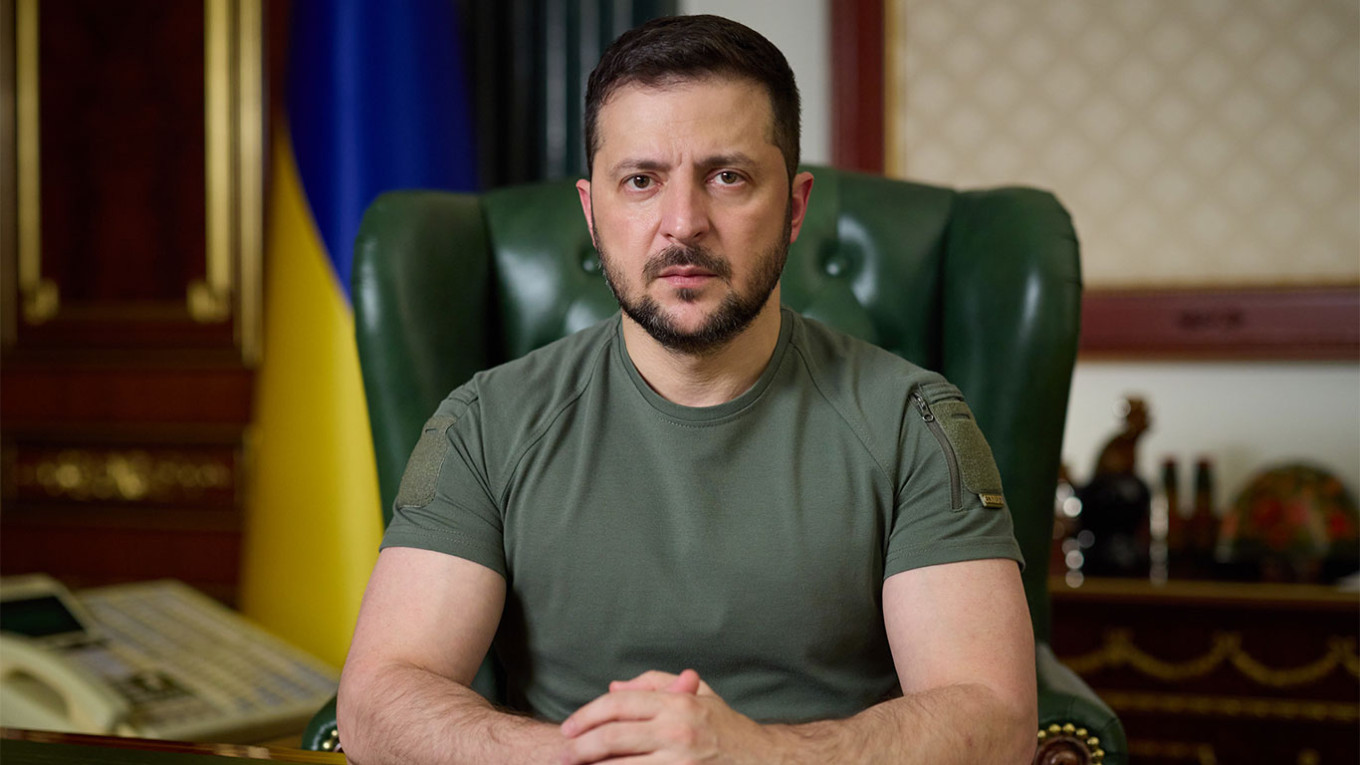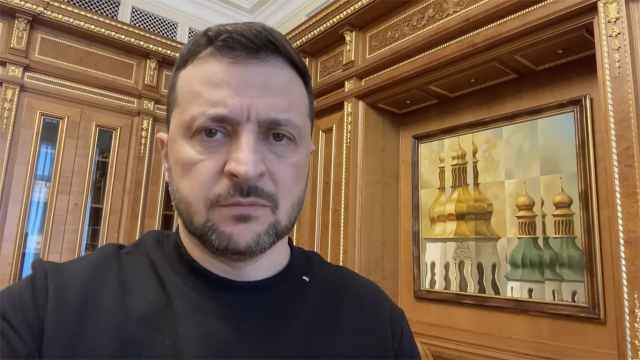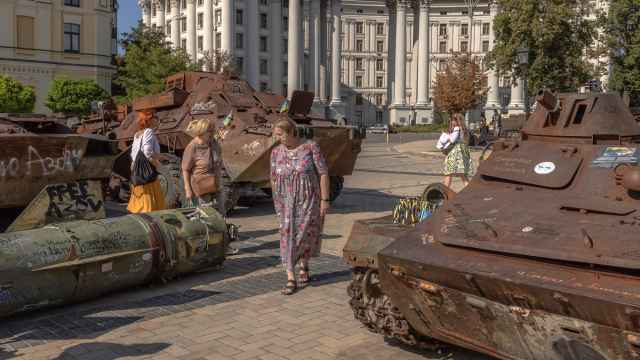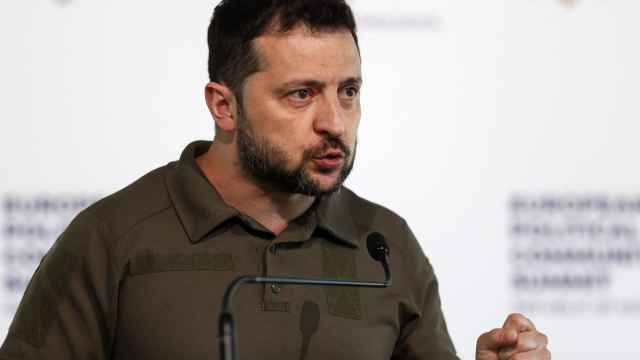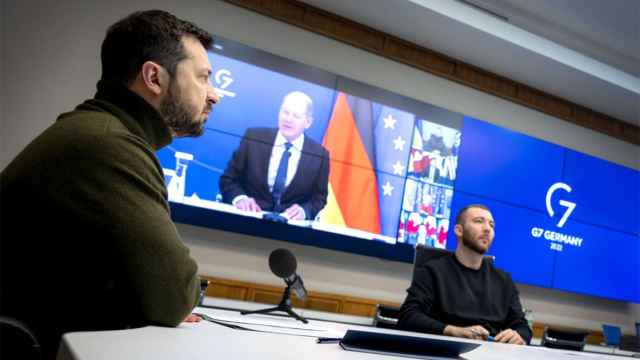President Volodymyr Zelensky vowed Friday to do everything to defeat Russia this year, as the first highly sought Leopard battle tanks arrived in Ukraine on the anniversary of Europe's largest conflict since World War II.
The German-made Leopard tanks from Warsaw rolled in to help Ukraine repel Russian troops as Polish Prime Minister Mateusz Morawiecki visited Kyiv to send a "clear and measurable signal of further support."
Poland will send more tanks soon, Morawiecki said, also offering to train Ukrainian pilots to fly F16 jets, as Western allies underlined their unwavering support.
The United States ramped up sanctions on Moscow, this time targeting the country's banks, military industry and semiconductor access, while the Group of Seven industrialized nations threatened embargo busters with "severe costs.
Russia remained defiant, with former president Dmitry Medvedev insisting that his country is ready to push its offensive "to the borders of Poland."
Tensions were also building on Ukraine's border with Moldova. Moscow, claiming Kyiv is plotting to invade the breakaway region of Transnistria, has promised to respond. Moldova denied any threat from Ukraine.
Zelensky said Ukraine will prevail if the West keeps to its pledges on weaponry and financial contributions.
"If partners respect all their promises and deadlines, victory will inevitably await us," Zelensky said during a press conference that started with a minute of silence.
Earlier Friday, he said in a statement that Ukraine "will do everything to gain victory this year" while Defense Minister Oleksiy Reznikov said his army was gearing up for a counteroffensive.
'Spirit is strong'
A year ago to the day, Russian President Vladimir Putin stunned the world by sending troops across the border, a move seen as punishment for Kyiv's pivot to the West.
The war has devastated swathes of Ukraine, displaced millions, turned Russia into a pariah in the West and, according to Western sources, caused more than 150,000 casualties on each side.
Demonstrators protesting against Moscow's aggression marched in cities across Europe to mark the invasion anniversary.
In Berlin, activists placed a Russian tank wreck in front of the Russian embassy.
Crowds fell silent for a minute from Tallinn to London while key buildings across Europe were draped or lit up in the blue and yellow colors of the Ukrainian flag.
A year ago, Russian troops sought to rapidly install a pro-Moscow regime in Ukraine but failed to conquer Kyiv and subsequently suffered defeats in northeastern and southern Ukraine.
Since October, Russia has pummelled Ukraine's energy infrastructure, causing power shortages for millions over winter.
In a recent Ukrainian poll, nearly one in five said they had lost a loved one in the war.
Despite the daily trials, many Ukrainians refuse to be cowed.
In Bucha, where Russia has been accused of widespread atrocities, 64-year-old Galyna Gamulets recalled coming under fire from Russian troops for "more than two weeks."
She voiced pride in her nation and said that "we will succeed" in repelling the invaders.
New sanctions
The West, which has imposed increasingly stringent sanctions on Russia and boosted humanitarian aid and arms supplies for Ukraine, unveiled more help on Friday.
The United States announced sweeping sanctions not only aimed at Russia but also hitting "over 200 individuals and entities" across Europe, Asia and the Middle East that are supporting Moscow's war.
After a video call, G7 allies warned that "third countries or other international actors who seek to evade or undermine our measures" must "cease providing material support to Russia’s war, or face severe costs".
The new aid package from Washington came days after President Joe Biden arrived in Kyiv on a historic visit and pledged new arms deliveries.
Along with contributions from Sweden and Portugal, Germany said it has managed to cobble together a battalion of modern Leopard 2 tanks for Ukraine.
On Thursday, the United Nations voted overwhelmingly to demand Russia "immediately" and "unconditionally" withdraw its troops from Ukraine.
But key players China and India abstained, as fears rose in the West that Beijing was considering arming Russia.
China has sought to position itself as a neutral party while maintaining close ties with Russia.
Releasing a 12-point position paper on Friday, Beijing urged Ukraine and Russia to hold peace talks as soon as possible and said all territorial sovereignty should be respected.
Zelensky said he was planning to meet China's President Xi Jinping after Beijing's call for peace talks, noting that Beijing's paper appeared to show "there is respect for our territorial integrity, security issues."
Moscow said it "highly values" China's contribution but insisted that any conflict settlement must recognize Russia's control over four Ukrainian regions it annexed.
Western allies were cautious in their reception of China's plan, with German President Frank-Walter Steinmeier saying it was "still doubtful" if Beijing sincerely wanted to play a constructive role in seeking peace.
NATO chief Jens Stoltenberg said Beijing simply "doesn't have much credibility because they have not been able to condemn the illegal invasion of Ukraine."
'Miracles happen'
On the frontline in eastern Ukraine, Kyiv troops' morale remained high.
"God is helping us. Nobody thought that Ukraine would hold," said a soldier who goes by the call sign "Cook" in the eastern region of Donetsk. "I know that miracles happen,"
Despite military setbacks and sanctions, Putin, 70, has refused to back down, accusing the West of supporting neo-Nazi forces and claiming Russia's survival was at stake.
"We are protecting people's lives, our native home," Putin said in his state of the nation address on Tuesday. "And the goal of the West is endless power."
Putin's assault on Ukraine and mobilization of reservists have sparked what might be Russia's largest mass exodus since the Bolshevik Revolution in 1917.
But with television propaganda in overdrive, many Russians have rallied behind Putin despite economic trouble and multiplying casualties.
"The country is really changing for the better," said Lyubov Yudina, a 48-year-old security guard in Moscow.
But Ruslan Melnikov, a 28-year-old teacher, was dejected. "I don't see any future now."
A Message from The Moscow Times:
Dear readers,
We are facing unprecedented challenges. Russia's Prosecutor General's Office has designated The Moscow Times as an "undesirable" organization, criminalizing our work and putting our staff at risk of prosecution. This follows our earlier unjust labeling as a "foreign agent."
These actions are direct attempts to silence independent journalism in Russia. The authorities claim our work "discredits the decisions of the Russian leadership." We see things differently: we strive to provide accurate, unbiased reporting on Russia.
We, the journalists of The Moscow Times, refuse to be silenced. But to continue our work, we need your help.
Your support, no matter how small, makes a world of difference. If you can, please support us monthly starting from just $2. It's quick to set up, and every contribution makes a significant impact.
By supporting The Moscow Times, you're defending open, independent journalism in the face of repression. Thank you for standing with us.
Remind me later.


